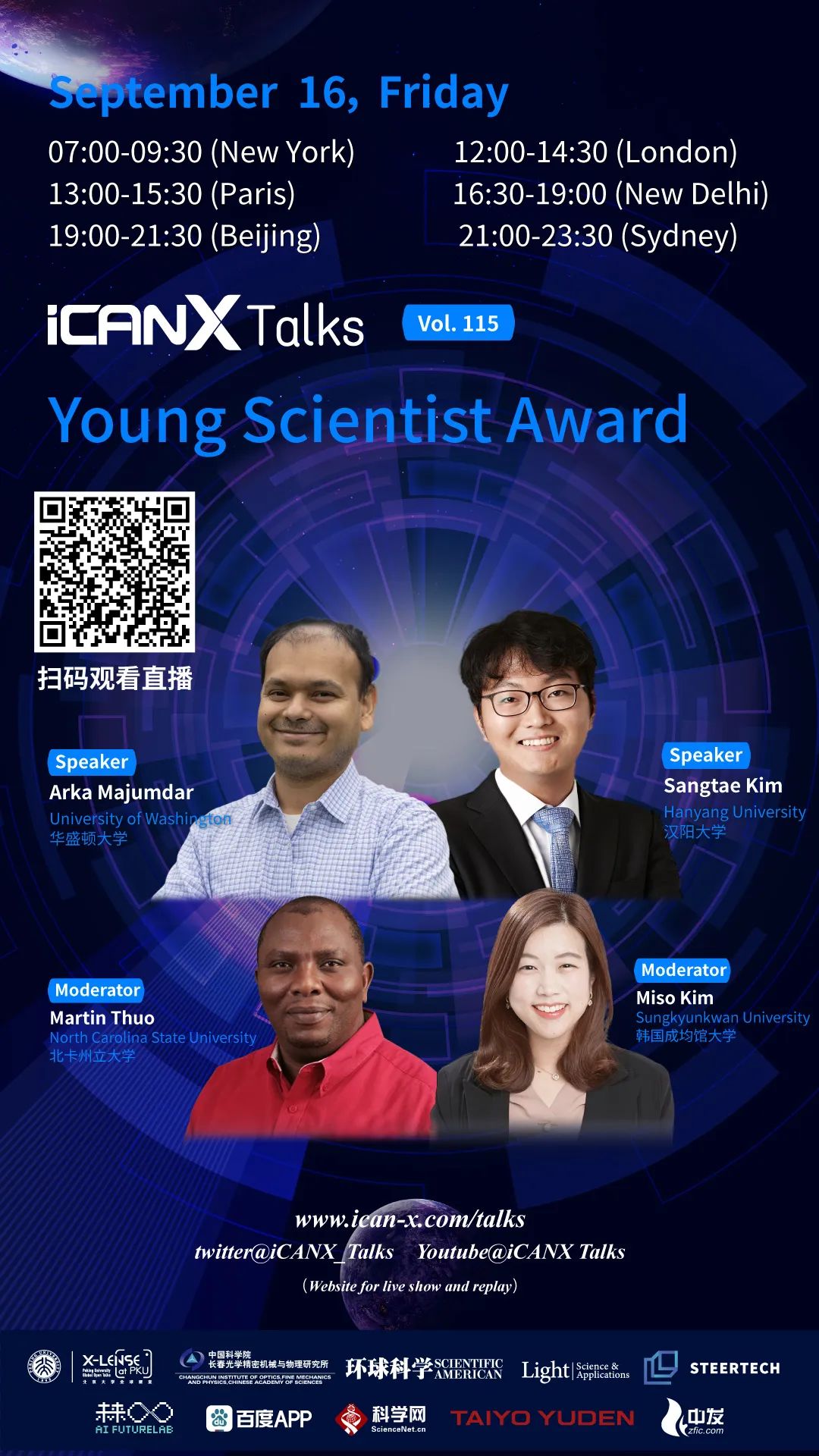[Lecture] Stress-Electrochemistry Coupling for Energy Applications & Software Defined Meta-Optics
Sep. 16, 2022
Time: 20:00 pm, September 16, 2022, GMT+8
Venue: iCANX Talks platform
Long press to identify the QR code and jump to the webpage!
Topic 1: Stress-Electrochemistry Coupling for Energy Applications
Speaker 1: Sangtae Kim, Hanyang University
Abastrat
Stress is a universal thermodynamic handle with directionality. As we move into the nanoscale regime, materials become stronger than their bulk counterpart, increasing the applicability of stress to tune the materials properties. In this talk, I will introduce stress-electrochemistry coupling and their potential applications to overcome challenging problems in energy harvesting devices and hydrogen storage materials. I will present results on electrochemically driven mechanical energy harvesters, where continuous current on the order of 1-10 seconds can be generated via electrochemical means, as opposed to 100 milliseconds in conventional piezoelectric generators. Results from hydrogen storage materials, another application example of the stress-potential-composition coupling, will be shown, where graphene oxide encapsulation provides stress to the palladium nanoparticles in the composite, tuning the thermodynamics of hydrogen storage properties.
Biography
Professor Sangtae Kim is an Assistant Professor in the Department of Nuclear Engineering, Hanyang University. He received his B.S. at University of California, Berkeley in 2010 and Ph.D. under the guidance of Prof. Ju Li at Massachusetts Institute of Technology in 2016. Prior to joining Hanyang University, Sangtae worked at Korea Institute of Science and Technology as a senior research scientist. His group currently supports 1 postdoctoral researcher, 4 graduate students and 2 undergraduate researchers. He has served as a local symposium organizing committee for Nano Korea 2019-2020 and local organizing committee for NGPT 2018. He has published 39 research papers, holds 2 US patents, and edited 1 special issue of Journals. He has won the Best Teacher Award at Hanyang University and Best Poster Award at 2015 Materials Research Society Spring Meeting.
Topic 2: Software Defined Meta-Optics
Speaker 2: Arka Majumdar, University of Washington, Seattle
Abstract
Modern image sensors consist of systems of cascaded and bulky spherical optics for imaging with minimal aberrations. While these systems provide high quality images, their improved functionality comes at the cost of increased size and weight. One route to reduce a system’s complexity is via computational imaging, in which much of the aberration correction and functionality of the optics is shifted to post-processing in software. Alternatively, a designer could miniaturize the optics by replacing them with diffractive optical elements, which mimic the functionality of refractive systems in a more compact form factor. Meta-optics are an extreme example of such diffractive elements, in which quasiperiodic arrays of resonant subwavelength optical antennas impart spatially varying changes on a wavefront. While separately both computational imaging and meta-optics are promising avenues toward simplifying optical systems, a synergistic combination of these fields can further enhance system performance and facilitate advanced capabilities.
In this talk, I will present a method to combine these two techniques to enable ultrathin optics for performing full-color imaging across the whole visible spectrum, varifocal imaging as well as high precision depth sensing. I will also discuss the use of computational techniques for designing meta-optics with exotic behaviors lacking any intuition-informed design, as well as for performing computation on incident light, with potential applications in optical information processing, and object detection. By combining meta-optical frontend and software backend, we can realize compact imaging systems with unprecedented functionalities, including broadband aberration-free imaging, depth sensing and optical computing. We believe such hybrid digital-optical system will create a new research field on “Software Defined Optics”, akin to Software Defined Radio, where the software is used to simplify the hardware.
Biography
Prof. Arka Majumdar is an Associate Professor in the departments of Electrical and Computer Engineering and Physics at the University of Washington (UW). He received B. Tech. from IIT-Kharagpur (2007), where he was honored with the President’s Gold Medal. He completed his MS (2009) and Ph.D. (2012) in Electrical Engineering at Stanford University. He spent one year at the University of California, Berkeley (2012-13), and then in Intel Labs (2013-14) as postdoc before joining UW. His research interests include developing a hybrid nanophotonic platform using emerging material systems for optical information science, imaging, and microscopy. Prof. Majumdar is the recipient of multiple Young Investigator Awards from the AFOSR (2015), NSF (2019), ONR (2020) and DARPA (2021), Intel early career faculty award (2015), Amazon Catalyst Award (2016), Alfred P. Sloan fellowship (2018), UW college of engineering outstanding junior faculty award (2020), iCANX Young Scientist Award (2021) and IIT-Kharagpur Young Alumni Achiever Award (2022). He is co-founder and technical advisor of Tunoptix, a startup commercializing software defined meta-optics.
Source: iCANX

